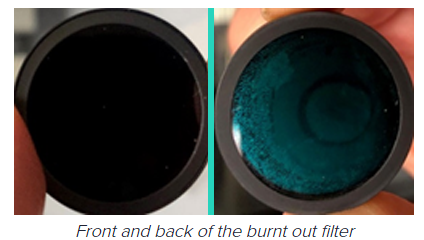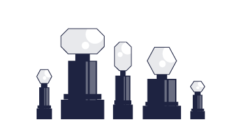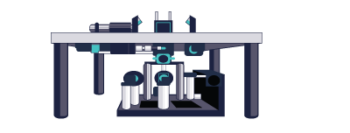How to deal with metal halide lamp burning out your filter for fluorescence microscopy.
This short case study covers one of our customer’s challenges with a burnt out fluorescence microscopy filter, what the solution was and the result.
The Challenge
Researchers at the University of Cambridge were trying to image fluorescence samples on their Olympus IX51 microscope, when they noticed that they had to keep increasing the exposure time of their experiment in order to get the same quality image as they had previously acquired. They asked us to help get to the root of the problem.
At Laser 2000 we believe it is of the upmost importance that our customers are satisfied and have the equipment that they need, in full working order. We will do everything in our power to make sure that this happens. This includes coming to you.
On the visit to the laboratory in Cambridge, we discovered that one of the filters in the microscope had burnt out. The cause of this was highly likely to be the fact that the previous light source for the microscope was a metal halide lamp. Even though this was changed to an LED light source some time ago, the filters were never changed. The high Ultra-Violet component from the metal halide lamp most likely burnt out the filter over time, which then prevented the LED light from being transmitted, reducing the DAPI excitation and increasing experiment runtime.

The solution
After identifying the burn out issue, we replaced the filter set with one from Semrock – the pioneers of the fluorescence filter world, known for their high-quality products. The filter set was optimised for LED-based light sources as the spectral output of these light sources differs from that of metal halides. All Semrock filters are hard coated with sophisticated Ion Beam Sputtering Technology, which makes them extremely durable – they don’t burn out! We offer a 10-year warranty on our filters, which is based on real data, so you can be confident that your filter won’t fail. If you’re not exactly sure which one you require, we also offer a 30-day sale or return so you can make sure it matches your requirements. We keep a large amount of stock here on-site in the UK, which means that we are able to offer next day UK delivery on these items.
To find out more about some of the benefits of switching to an LED-based light source from a metal halide lamp, read our blog post here. We also offer a flexible, reasonably priced, multi-channel LED light source capable of having the LEDs and filters switched within minutes by the user – the niji from Bluebox Optics. Designed and built here in the UK to be one of the quietest LED sources on the market, the niji is mechanically compatible with most standard microscopes. Contact us if you’d like to see a demo or book your free evaluation unit.
The Results
After testing the microscope with these replacement filters, it was obvious that the filters were now transmitting UV excitation, solving the problem, preventing it from happening again and allowing the team to carry on with their experiments. By installing hard coated Semrock filters that are optimised for LED-based light sources, we solved the original burn out issue as well as optimising the experiment. The team at the University of Cambridge were delighted with the results.
We know how frustrating it can be when equipment doesn’t work as it should. We also know that it’s even more frustrating when you have to send it back for diagnostics and repairs, potentially putting you weeks behind schedule. Customer support is at the heart of what we do and we will always do everything that we can, pre or post-sale, to support you. If you have any questions or would like to know more about any of the products discussed here, please don’t hesitate to get in touch! – we’d love to work with you!































